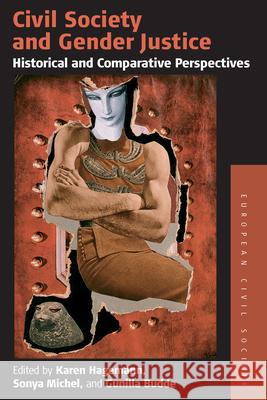Civil Society and Gender Justice: Historical and Comparative Perspectives » książka
Civil Society and Gender Justice: Historical and Comparative Perspectives
ISBN-13: 9780857451705 / Angielski / Miękka / 2011 / 320 str.
Civil Society and Gender Justice: Historical and Comparative Perspectives
ISBN-13: 9780857451705 / Angielski / Miękka / 2011 / 320 str.
(netto: 130,11 VAT: 5%)
Najniższa cena z 30 dni: 135,22
ok. 22 dni roboczych.
Darmowa dostawa!
"On the whole, this much needed book offers both a necessary corrective to and further development of theoretical thinking about and empirical analysis of civil society. It should be required reading among historians, political scientists and sociologists alike." - Journal of Contemporary European Studies "Civil Society and Gender Justice does double intellectual duty: at the same time that it subjects the idea of civil society to scrupulous feminist critique, it demonstrates the theoretical utility and political necessity of that concept. Cogently argued and studded with illuminating transnational case studies, this single volume is priority reading for feminists, historians, and citizens." - Mary P. Ryan (University of California Berkeley) "Finally, in this rich collection of sparkling essays, the much ballyhooed concept of 'civil society' receives a searching critique and reconstruction from the standpoint of gender. Ranging well beyond the usual Western European and North American contexts, the contributors disclose both the exclusionary limitations and the transformative prospects of multiple incarnations and imaginings of civil society." - Nancy Fraser (New School for Social Research) Civil society and civic engagement have increasingly become topics of discussion at the national and international level. The editors of this volume ask, does the concept of "civil society" include gender equality and gender justice? Or, to frame the question differently, is civil society a feminist concept? Conversely, does feminism need the concept of civil society? This important volume offers both a revised gendered history of civil society and a program for making it more egalitarian in the future. An interdisciplinary group of internationally known authors investigates the relationship between public and private in the discourses and practices of civil societies; the significance of the family for the project of civil society; the relation between civil society, the state, and different forms of citizenship; and the complex connection between civil society, gendered forms of protest and nongovernmental movements. While often critical of historical instantiations of civil society, all the authors nonetheless take seriously the potential inherent in civil society, particularly as it comes to influence global politics. They demand, however, an expansion of both the concept and project of civil society in order to make its political opportunities available to all.
"On the whole, this much needed book offers both a necessary corrective to and further development of theoretical thinking about and empirical analysis of civil society. It should be required reading among historians, political scientists and sociologists alike." · Journal of Contemporary European Studies"Civil Society and Gender Justice does double intellectual duty: at the same time that it subjects the idea of civil society to scrupulous feminist critique, it demonstrates the theoretical utility and political necessity of that concept. Cogently argued and studded with illuminating transnational case studies, this single volume is priority reading for feminists, historians, and citizens." · Mary P. Ryan (University of California Berkeley)"Finally, in this rich collection of sparkling essays, the much ballyhooed concept of civil society receives a searching critique and reconstruction from the standpoint of gender. Ranging well beyond the usual Western European and North American contexts, the contributors disclose both the exclusionary limitations and the transformative prospects of multiple incarnations and imaginings of civil society." · Nancy Fraser (New School for Social Research)Civil society and civic engagement have increasingly become topics of discussion at the national and international level. The editors of this volume ask, does the concept of "civil society" include gender equality and gender justice? Or, to frame the question differently, is civil society a feminist concept? Conversely, does feminism need the concept of civil society?This important volume offers both a revised gendered history of civil society and a program for making it more egalitarian in the future. An interdisciplinary group of internationally known authors investigates the relationship between public and private in the discourses and practices of civil societies; the significance of the family for the project of civil society; the relation between civil society, the state, and different forms of citizenship; and the complex connection between civil society, gendered forms of protest and nongovernmental movements. While often critical of historical instantiations of civil society, all the authors nonetheless take seriously the potential inherent in civil society, particularly as it comes to influence global politics. They demand, however, an expansion of both the concept and project of civil society in order to make its political opportunities available to all.











